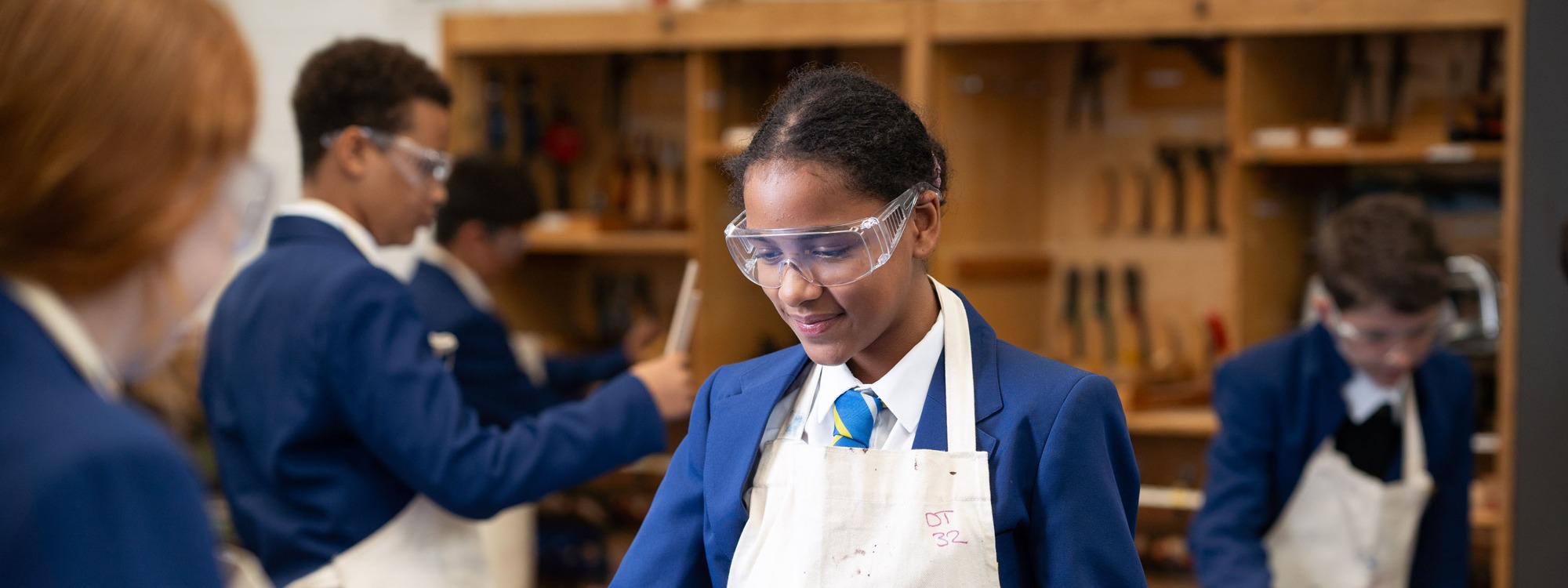- Home
- Parents
- Subject Information
- Design Technology
Design Technology
‘Every great design starts with an even better story’ - Lorinda Mamo
Subject Overview
The consequences of design are all around us. Every product, no matter how small or insignificant, has been through a design process. Often the process is overlooked by the outcome. Design Technology opens students' minds to the process and the beauty that comes from solving a problem. From design and make projects at Key Stage 3; to the full design process at Key Stage 5; our students are fully immersed in the world of design.
Curriculum Intent:
Our curriculum ensures that all students have access to and understanding of the design process. Across Key Stage 3 we look to enrich students' experiences by working with a wide range of materials. From wood to metal to textiles, all our students are exposed to the working properties of key materials. These experiences are underpinned by the theory of design and material properties. At Key Stage 4 we hone these skills to make sure students access the right qualification for them. From Engineering Design to Design Technology, we blend the theory elements with the practical skills needed to successfully navigate the design process. The skills and knowledge acquired, allows them to flourish at Key Stage 5. Using the first year of A Level study to deepen and enrich student understanding, allows them to develop a sense of independence as they navigate the whole design process. Their final product truly is a ‘cradle to the grave’ experience of design.
Curriculum Implementation:
In Key Stage 3 all students work with wood, metal, textiles and resin. These materials are experienced through design and make projects that show off student creativity as well as consolidate knowledge from Key Stage 2. In Key Stage 4 our two pathways cater for both the physical and technical student. Engineering Design is taught through modern techniques with a focus on CAD. Students develop the necessary knowledge that underpins the two Non-Examined Assessments (NEA) that make up 60% of their overall grade. Design Technology GCSE follows a sliding scale of design and make projects. Projects throughout Year 9 and 10 build on skills and theory elements to allow students to flourish in their final NEA.
Curriculum Impact:
Students are assessed through careful monitoring of both the practical skills and theoretical knowledge. Across all project work students are assessed in the key elements of the design process as well as end of unit tests. These two elements are used to judge a student's progress from Key Stage 3 through 5.
Key Stage 3 (Years 7–8)
Students will work through full design and make projects looking at the key material elements. Block bots (wood), Drawstring bag (textiles), Dominos (resin) and Key ring (metal) projects allow students introductory access to basic skills, techniques and processes that underpin Key Stage 4 and the working world.
Key Stage 4 (Years 9 - 11)
Students are able to specialise at Key Stage 4 by undertaking either: Engineering Design or Design Technology.
Engineering design - OCR National. This course is a GCSE equivalent with the course consisting of 2 NEA projects (60%) and 1 external exam (40%). This course focuses on the key elements of the design process with a heavy focus on CAD.
Design Technology - AQA GCSE. This course is a traditional GCSE with 1 NEA (50%) and 1 external exam (50%). The course consists of practical skill development alongside a broad theoretical specification. Well rounded students can expect to feature more time in the workshop but a broader theory exam.
Students cannot pick both subjects.
Key Stage 5 (Years 12–13)
Product Design - A Level AQA. This course gives students the opportunity to explore ideas of originality and value, to question and challenge. The AQA course is divided into two sections of theory: Technical Principles & Designing & Making Principles. Our students will undertake a substantial design and make task and produce a final prototype based on a context and design brief that they have developed themselves. Our experienced and dedicated staff aim to enthuse our future designers with a passion for design.
Enrichment Opportunities:
Throughout their time at The Forest School students in our department have the opportunity to further their development outside of the curriculum. Students are encouraged to join various clubs (e.g. STEM Club), Competitions (e.g. Young Designers) and trips (e.g. V&A Museum).
Curious about the curriculum
Resources and Facilities:
Wood working workshop, Metal working workshop, Catering room, laser cutter, 3D printer, sewing machines.
Contact Information:
If you'd like to find out more please contact Mr A Hollands, Subject Leader on ahollands@forest.academy
